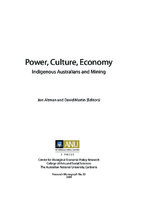Power, Culture, Economy (CAEPR 30)
Indigenous Australians and Mining
Author(s)
Altman, Jon
Martin, David
Language
EnglishAbstract
Research over the past decade in health, employment, life expectancy, child mortality, and household income has confirmed that Indigenous Australians are still Australia’s most disadvantaged group. Those residing in communities in regional and remote Australia are further disadvantaged because of the limited formal economic opportunities there. In these areas mining developments may be the major—and sometimes the only—contributors to regional economic development. However Indigenous communities have gained only relatively limited long-term economic development benefits from mining activity on land that they own or over which they have property rights of varying significance. Furthermore, while Indigenous people may place high value on realising particular non-economic benefits from mining agreements, there may be only limited capacity to deliver such benefits. This collection of papers focuses on three large, ongoing mining operations in Queensland, Western Australia and the Northern Territory under two statutory regimes—the Aboriginal Land Rights (Northern Territory) Act 1976 and the Native Title Act 1993. The authors outline the institutional basis to greater industry involvement while describing and analysing the best practice principles that can be utilised both by companies and Indigenous community organisations. The research addresses questions such as:
What factors underlie successful investment in community relations and associated agreement governance and benefit packages for Indigenous communities?
How are economic and non-economic flows monitored?
What are the values and aspirations which Indigenous people may bring to bear in their engagement with mining developments?
What more should companies and government do to develop the capacity and sustainability of local Indigenous organisations?
What mining company strategies build community capacity to deal with impacts of mining? Are these adequate?
How to prepare for sustainable futures for Indigenous Australians after mine closure?
This research was conducted under an Australian Research Council Linkage Project, with Rio Tinto and the Committee for Economic Development of Australia as Industry Partners.
Keywords
australia; social conditions; aboriginal australians; economic conditions; mineral industries; Indigenous Australians; Indigenous peoples; Jabiluka; Mining; Pilbara; Rio Tinto (corporation)DOI
10.26530/OAPEN_459470OCN
1166196699Publisher
ANU PressPublisher website
https://press.anu.edu.au/Publication date and place
Canberra, 2009Series
Research Monograph, 30Classification
Social and cultural anthropology
Economics


 Download
Download Web Shop
Web Shop